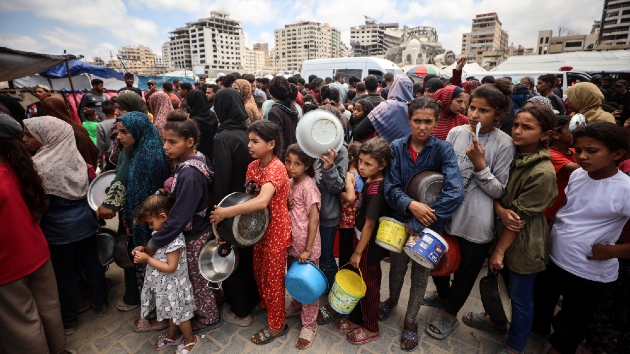
(GAZA) -- As the humanitarian crisis in Gaza continues to unfold, video showed children sitting in lines waiting for food on the side of the road on Tuesday.
Two million people in the Gaza Strip face "extreme hunger and famine without immediate action," the World Food Programme said last week.
The children gathered by a community kitchen, waiting with their empty pots, according to the video verified by ABC News.
In the scramble for hot food, a child was scalded after hot soup was spilled on him, the video shows. The child is seen crying in pain as someone pours water on him. Another video showed a child scooping up flour spilled on the ground mixed with dirt.
"The children of Gaza need protection," UNICEF, the U.N. agency for children, said in a statement on Tuesday. "They need food, water, and medicine. They need a ceasefire. But more than anything, they need immediate, collective action to stop this once and for all."
Over 1,300 Palestinian children have been killed and around 4,000 injured since Israel ended the ceasefire in March, Palestinian Ambassador Riyad Mansour said Wednesday in a passionate speech during a U.N. Security Council meeting on Gaza.
"Dozens of children are dying of starvation. The images of mothers embracing their motionless bodies, caressing their hair, talking to them, apologizing to them," Mansour said, crying and slamming the table. "Excuse me, Mr.President, I have grandchildren, I know what they mean to their families and to see the situation of the Palestinians without us having hearts to do something is beyond the ability of any normal human being to tolerate."
"Flames and hunger are devouring Palestinian children. This is why we are so outraged as Palestinians everywhere, the 14 million of us in the occupied territories, in the diaspora, in the refugee camps, in far places, all the way to California and in between. We love our children. We love our people. We don't want to see them going through this tragedy and this savage attacks by those who claim the virtues of fighting against barbarism," Mansour said.
Last week, more than a dozen World Food Programme trucks were looted in southern Gaza while en route to WFP supported bakeries.
"These trucks were transporting critical food supplies for hungry populations waiting anxiously for assistance. Hunger, desperation, and anxiety over whether more food aid is coming, is contributing to rising insecurity," the WFP said in a statement.
The Israeli government had been implementing a blockade on all humanitarian aid being sent into Gaza since March 2. The blockade was instituted to pressure Hamas to release the remaining hostages, Israel said.
Humanitarian groups and the United Nations have distanced themselves from the new plan to distribute aid into Gaza that began last week. Aid trucks started slowly re-entering Gaza last week, according to the U.N. and the Gaza Government Media Office.
"WFP cannot safely operate under a distribution system that limits the number of bakeries and sites where Gaza’s population can access food. WFP and its partners must also be allowed to distribute food parcels directly to families -- the most effective way to prevent widespread starvation," the WFP said last week.
The Israeli blockade on humanitarian aid entering the Gaza Strip has caused widespread malnutrition and conditions likely to lead to famine, according to the U.N. and other international aid organizations.
One in five people in Gaza, about 500,000 people, faces starvation, the Integrated Food Security Phase Classification platform said on May 12, according to the U.N. Of those, 71,000 children need treatment for acute malnutrition, according to the report.
Dr. Feroze Sidhwa, an American physician who volunteered in Gaza in 2024 and last month, spoke at the U.N. on Wednesday, describing the day Israel broke the ceasefire in March as the day he "witnessed the most extreme casualty event of my career." He said he had 221 trauma patients in his care.
Sidhwa also criticized the controversial new aid plan for Gaza, which he said constitutes a "weaponization and politicization of aid."
"If this continues, there will be no Palestinian doctors left -- no one to care for the sick and wounded," Sidwha said. "No Palestinians left to rebuild the health care system. We are losing a generation before our eyes, condemning patients to die from hunger, disease and despair -- deaths that could have been prevented."
Copyright © 2025, ABC Audio. All rights reserved.

